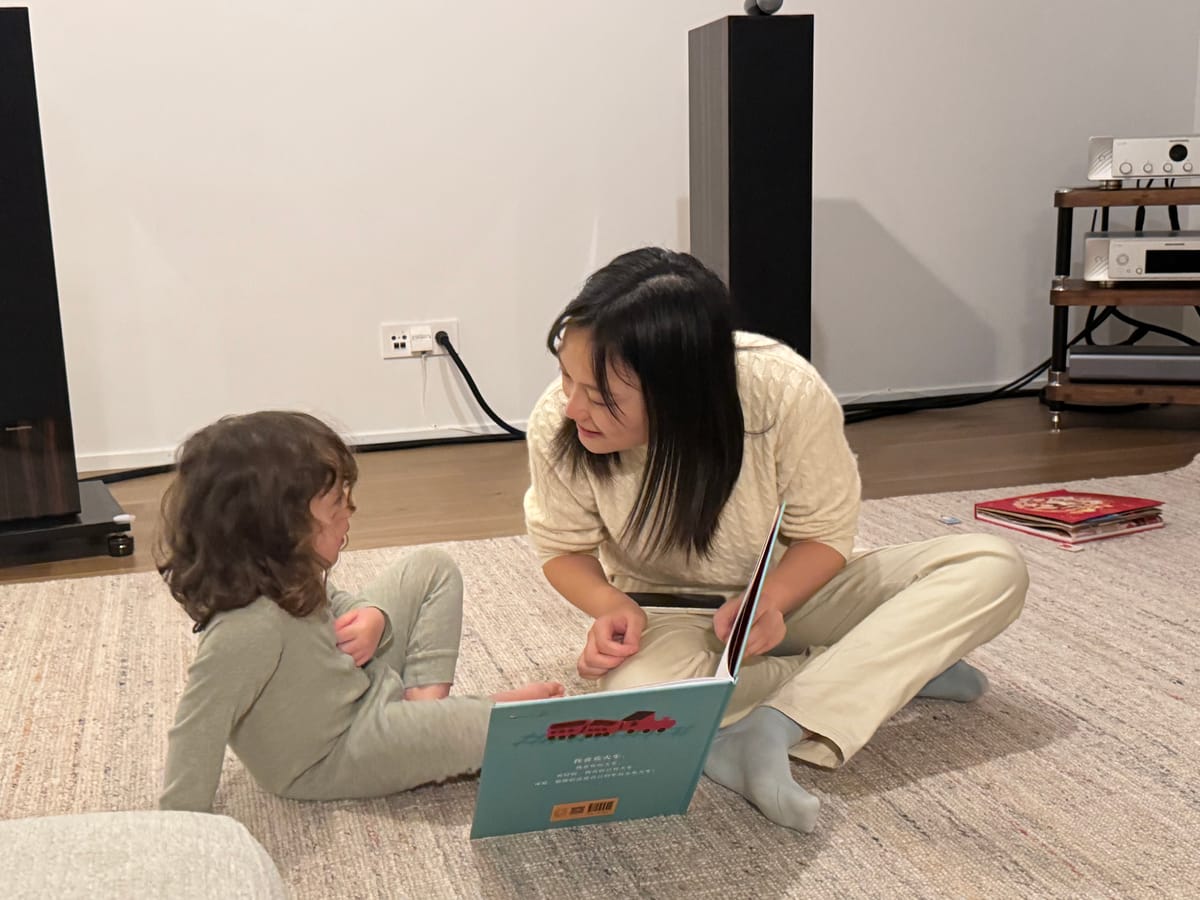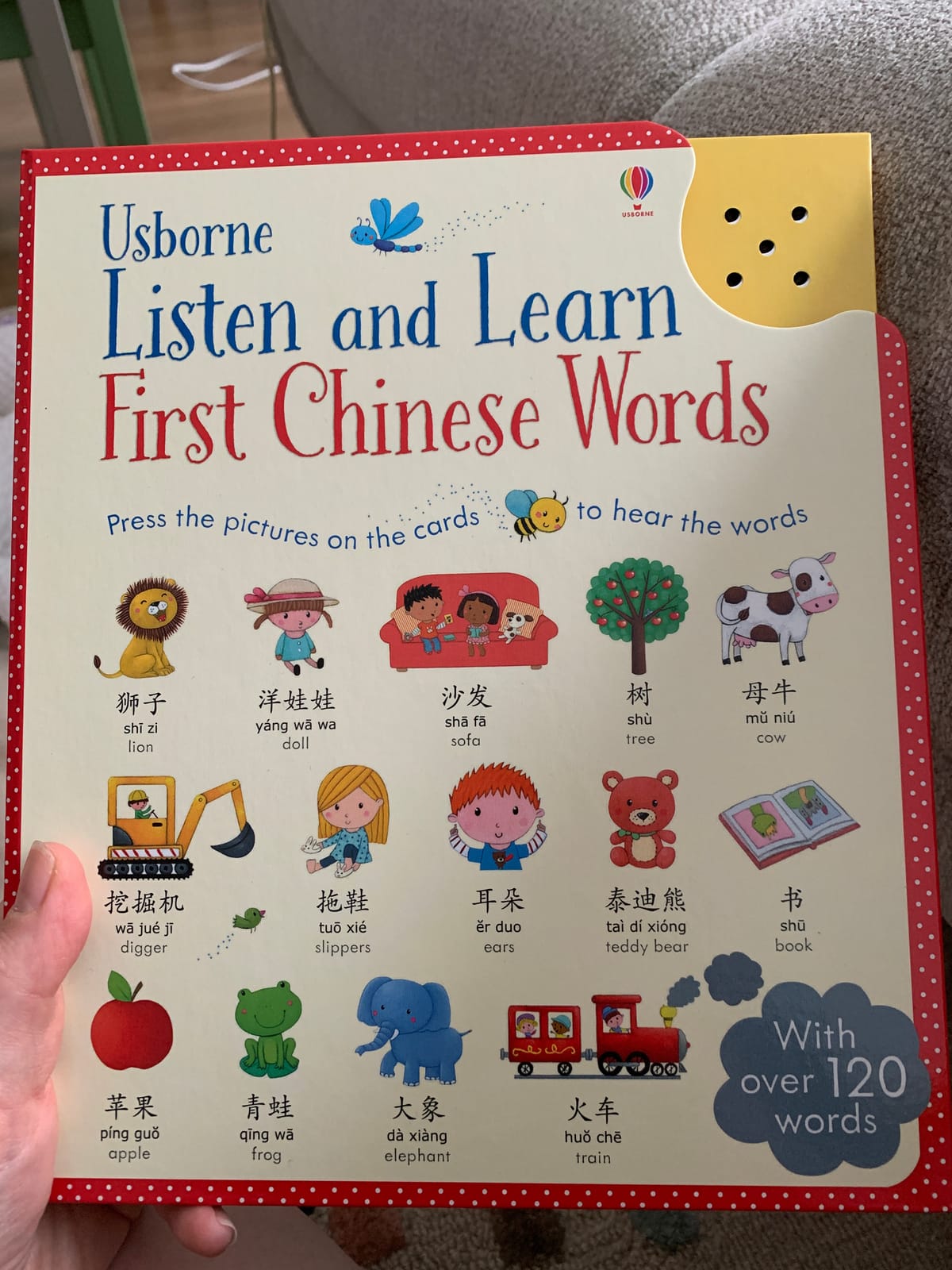Quick Summary
🗣️ Our Family Languages: Polish, English, German, and now Mandarin
👶 Child's Age: Started at 2 years old
🌏 Location: Zurich, Switzerland
🧠 Main Benefits: Early language advantage, cultural exposure, cognitive development
🔑 Key Insight: Children learn languages differently than adults—use this window of opportunity!
Learning languages opens up a world of opportunities—we all know that. But deciding which languages and at what age to introduce them is a tough question. Here's why we chose to send our toddler to a Mandarin preschool, despite already juggling multiple languages in our family.

Table of Contents
- Our Multilingual Family Setup
- The "Crazy" Decision to Add Chinese
- 4 Compelling Reasons to Choose Mandarin for Young Children
- How to Set Your Child (and Yourself) Up for Success
- Our Journey So Far
Our Multilingual Family Setup
Given our family's situation, our daughters have no choice but to grow up multilingual. I am Polish, my husband is British, and we live in Zurich, Switzerland. This environment alone gives our daughter Hanna the opportunity to become fluent in three languages—Polish, English, and German—without any special effort.
Switzerland itself has four national languages, with German, French, and Italian being widely spoken. So Hanna will likely pick up at least one more language during her education here.
I'm passionate about languages myself. I speak Polish, English, and German fluently and understand several others to varying degrees. With this language-rich environment, even I thought our daughter's linguistic exposure was sufficient.
The "Crazy" Decision to Add Chinese
Surprisingly, it was my husband—who speaks only his native English—who suggested adding another language to the mix. He's fascinated by Switzerland's multilingual environment and had this seemingly wild idea: what if we gave our daughter the opportunity to learn a widely spoken language that's particularly difficult to master later in life?
His reasoning made sense. Since English would be one of her first languages, she would "save" the countless hours other children must invest in learning it. Why not use that time advantage to learn something challenging like Mandarin?
One thing led to another, and we decided to send Hanna, our then 2-year-old daughter, to a Chinese playgroup.
Many people think we're crazy—after all, we have no family connections to China, and her brain is already processing three other languages! But the results have been so encouraging that I want to share why you might consider a similar path for your children.
4 Compelling Reasons to Choose Mandarin for Young Children
1. Early Language Learning Advantage (Why Mandarin is Perfect for Young Children)
Children have a unique ability to learn languages that diminishes with age. This is particularly important for Mandarin because:
- Tonal recognition: Mandarin's four tones completely change word meanings. Research shows infants can distinguish all language sounds, but this ability declines by 6-12 months (Kuhl et al., 2006).
- Character learning: Chinese requires memorizing thousands of unique characters rather than sounding out words. Studies show children's neural plasticity makes visual memorization easier (Cao et al., 2013).
- Natural immersion: Young children experience language differently—people speak slowly, use simple concepts, and repeat constantly. This natural learning environment rarely exists for adults.
- Accent development: Early exposure allows children to develop native-like pronunciation that is extremely difficult to achieve later in life.
2. Cultural Exposure and Appreciation: A 5,000-Year Heritage
Learning Mandarin connects children to one of the world's oldest continuous civilizations:
- Access to ancient wisdom: Direct access to philosophical traditions, literature, and cultural concepts without losing meaning in translation.
- Cultural perspective: Understanding Chinese festivals, traditions, and customs provides children with a comparative framework for their own cultural identity.
- Artistic exposure: Chinese calligraphy, painting, opera, and other art forms introduce aesthetic traditions entirely different from Western concepts.
- Cultural intelligence: Early exposure to a fundamentally different culture develops adaptability and openness to diverse perspectives—increasingly crucial skills in our global society.
3. Cognitive and Developmental Benefits
Research confirms that learning multiple languages offers significant brain benefits, especially when started early:
- Enhanced executive function: Multilingual children are better at focusing, switching between tasks, and filtering irrelevant information (Kovács & Mehler, 2009).
- Advanced problem-solving: Bilingual children often demonstrate more creative approaches to complex problems (Kharkhurin, 2010).
- Metalinguistic awareness: Greater understanding of how language works as a system helps with overall communication skills (Bialystok, 2001).
- Context adaptation: Children who navigate multiple languages become adept at reading nonverbal cues and responding appropriately to different communication contexts.
- Cognitive reserve: Building diverse neural pathways may help protect against cognitive decline later in life (Bak et al., 2014).
These benefits appear to be even stronger when the languages are structurally different (like Mandarin and European languages) because they exercise different neural pathways in the brain.
4. Unprecedented Global Opportunities
Mandarin proficiency offers significant practical advantages in our changing world:
- Demographic reach: With 1.4 billion speakers, Mandarin is the most spoken first language globally, providing access to nearly 20% of the world's population.
- Economic advantage: China is the world's second-largest economy and projected to become the largest. The Economist Intelligence Unit found that Mandarin skills can increase earning potential by 10-15% in certain fields.
- Academic access: China's universities are rapidly climbing global rankings, especially in STEM fields, offering quality education often at lower costs than Western institutions.
- Career differentiation: While English proficiency is becoming standard, Mandarin fluency remains a significant differentiator in competitive fields like international business, diplomacy, and technology.
- Innovation gateway: Many cutting-edge research papers in fields like artificial intelligence and renewable energy are now published in Chinese first.
Want more research-based tips on raising multilingual children?
Join our community:
How to Set Your Child (and Yourself) Up for Success
Setting up a positive Mandarin learning experience requires thoughtful preparation:
Choose the Right School
- Teacher quality: Look for teachers who connect well with children and create engaging environments.
- Teaching approach: Find programs that use play-based, immersive methods rather than rote memorization.
- Group dynamics: Small class sizes allow for more personalized attention and speaking opportunities.
- Cultural integration: Programs that incorporate cultural elements provide context and motivation.
Spark Interest in the Language and Culture
- Cultural events: Attend local celebrations of Chinese New Year, Dragon Boat Festival, or Mid-Autumn Festival.
- Media exposure: Introduce age-appropriate Chinese songs, stories, and (for older children) cartoons.
- Food exploration: Chinese cuisine offers a delicious way to connect language learning with sensory experiences.
- Practical application: Create opportunities to use Mandarin in real-world contexts whenever possible.
Learn Together
- Family involvement: Learn basic phrases alongside your child to show that you value the language.
- Consistent practice: Establish regular "Chinese time" in your routine, even if just 10-15 minutes daily.
- Celebrate progress: Acknowledge achievements, no matter how small, to build confidence.
- Patient approach: Remember that language learning has natural plateaus—maintain a long-term perspective.
Our Mandarin Journey So Far
This is just the beginning of our wonderful language journey with Mandarin. Though Hanna is still in the early stages, her progress has been encouraging.
What's fascinating is watching her language strategies develop:
- Strategic borrowing: When speaking Polish to me, she naturally fills gaps by borrowing English words when needed.
- Contextual understanding: In her Chinese playgroup, she speaks less but absorbs everything, demonstrating the receptive language skills that typically develop before productive skills.
- Adaptive communication: She uses her limited resources in each language effectively, showing the problem-solving approach typical of multilingual children.
Research supports what we're observing: studies show that children exposed to multiple languages develop enhanced executive function, including better attention control, cognitive flexibility, and working memory (Bialystok et al., 2012).
Is it challenging managing four languages with a young child? Absolutely. There are days when she mixes words or seems overwhelmed. But the moments of breakthrough make it all worthwhile.
We're excited to see where this linguistic adventure takes our family next, and I'll be sharing more updates on our progress through the newsletter.
Start Your Child's Mandarin Journey Now!
Common Concerns from Parents (And What Research Shows)
Parents often worry about adding Mandarin to their child's language repertoire:
- "Isn't Mandarin too difficult?"
While Mandarin has challenging aspects, its grammar is actually simpler than most European languages—no conjugations, genders, or plurals. Research shows children don't categorize languages as "difficult" and acquire them naturally through meaningful exposure. - "Will learning Mandarin confuse my child?"
Studies demonstrate that even babies can distinguish between different languages. Mandarin's distinct sound system and character-based writing actually help children separate it from European languages. - "We don't speak Mandarin at home—how can we support learning?"
Research confirms children can successfully learn languages not spoken at home through consistent, quality exposure. You don't need to be fluent—learning basics alongside your child shows them you value the language. - "Isn't it expensive to learn Chinese?"
Economic research found that bilingual individuals earn on average 2-3% higher wages, with premium languages like Mandarin often commanding higher returns—making early investment worthwhile over a lifetime.
Taking the First Steps
Getting started with Mandarin is easier than ever:
- Local Classes: Weekend Mandarin schools (often organized by Chinese community centers)
- Playgroups: Mandarin-language playgroups with other interested families
- Online Resources: Child-friendly Mandarin learning apps and videos
- Cultural Events: Chinese cultural festivals and community celebrations
- Bilingual Books: Simple stories that introduce basic characters and vocabulary
If I've sparked your interest, now it's your turn to unlock the Mandarin advantage for your child!
Do you have any questions about our experience with Mandarin preschool or multilingual parenting in general?
Let me know in the comments below, and I'll share what we've learned so far!
Related Posts:




Last updated: February 2025














Member discussion